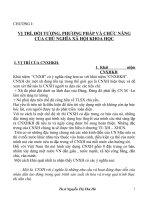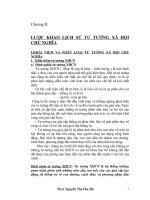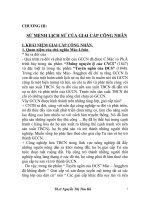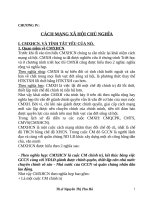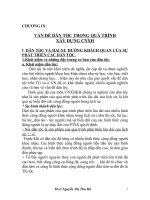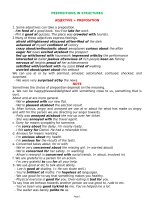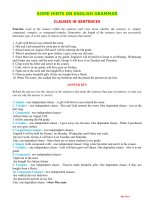Special Hints On Prepositions
Bạn đang xem bản rút gọn của tài liệu. Xem và tải ngay bản đầy đủ của tài liệu tại đây (66.24 KB, 7 trang )
PREPOSITIONS IN STRUCTURES
ADJECTIVE + PREPOSITION
1. Some adjectives can take a preposition.
- I'm fond of a good book. You'll be late for work.
- Phil is good at quizzes. The place was crowded with tourists.
2 Many of these adjectives express feelings.
afraid of/frightened of/scared of/terrified of the dark
ashamed of myself confident of victory
crazy about/enthusiastic about aeroplanes curious about the affair
eager for news excited at/about the prospect
fed up with/bored with housework impressed with/by the performance
interested in ballet jealous of/envious of rich people keen on fishing
nervous of heights proud of her achievements
satisfied with/content with my score tired of walking
worried about/upset about this setback
We can use at or by with alarmed, amazed, astonished, confused, shocked, and surprised.
- We were very surprised at/by the news.
NOTE
Sometimes the choice of preposition depends on the meaning.
a. We can be happy/pleased/delighted with something close to us, something that is ours.
About and at are more general.
- We're pleased with our new flat.
- We're pleased at/about the election result.
b. After furious, angry and annoyed we use at or about for what has made us angry and with for the
person we are directing our anger towards.
- Polly was annoyed at/about the mix-up over her ticket.
- She was annoyed with the travel agent.
c. Sorry for means sympathy for someone.
- I'm sorry about the delay. I'm nearly ready.
- I felt sorry for Daniel. He had a miserable time.
d. Anxious for means 'wanting'.
- I'm anxious about my health.
- I'm anxious for the results of the tests.
e. Concerned takes about, for or with.
- We're very concerned about the missing girl. (= worried about)
- We're concerned for her safety. (= wanting)
- Alison's research is concerned with social trends. (= about, involved in)
f. We are grateful to a person for an action.
- I'm very grateful to you for all your help.
3. We use good at etc to talk about ability.
- Lee is good at skating. (= He can skate well.)
- You're brilliant at maths. I'm hopeless at languages.
- We use good for to say that something makes you healthy.
Page 1
- Physical exercise is good for you. Over-eating is bad for you.
To say how we behave towards another person we use good to, rude to etc.
- You've been very good to/kind to me. You've helped me a lot.
- The waiter was barely polite to us.
4 Here are some more examples of adjective + preposition.
absent from work
available to members/available for hire
capable of better things
clear to/obvious to all the spectators
conscious of/aware of what you're doing
dependent on public money
different to/from our normal routine a town
famous for its history
fit for a marathon a bucket
full of water
guilty of murder
harmful to the environment
involved in various activities
kind to animals a door
made of steel
married to/engaged to a postman
opposed to the plan
popular with young people
present at the meeting
ready for/prepared for the journey
related to a friend of ours
responsible for our safety
safe from attack the
same as always
I'm serious about what I said
short of time similar to my last job
successful in my search food
suitable for freezing
superior/inferior to other products
sure of/certain of the facts
a style typical of/characteristic of the period
used to/accustomed to late nights
Welcome to Wales.
nothing wrong with me
NOUN + PREPOSITION
NOTE
a. Sometimes we use the same preposition as with a related verb or adjective.
Verb/Adjective + preposition Noun + preposition
- He objected to the idea. his objection to the idea.
Page 2
- It protects you from the cold. protection from the cold.
- I'm interested in art / take an interest in art.
- We were angry at what happened. our anger at what happened.
Sometimes the verb takes a direct object but the noun takes a preposition.
- I answered the question / my answer to the question.
- They demanded more money / their demand for more money.
b. Some nouns can take different prepositions.
- a discussion of/about/on politics today
Sometimes the choice of preposition depends on the meaning.
- his apology for being late his apology to the teacher
2. Here are some more examples of noun + preposition.
a. Advantage
- England had the advantage of playing at home.
- There's usually an advantage in playing at home.
b. Chance, possibility
- the chance/opportunity of a quick profit no possibility of an agreement
c. Connection, difference etc
- a link/connection with another murder
- a link/connection between the two murders
- Jill's relationship with Hugo
- the relationship between them
- the contrast with the other side of town
- the contrast between the two areas
- the difference between American football and soccer
- an alternative to conventional medicine
- a substitute for wood
d. Effect, influence
- The new law has had some effect on people's behaviour.
- The Beatles had a great influence on/over their generation.
e. Increase etc
- an increase/a rise in crime an increase la rise of ten per cent
- a reduction/decrease in sales a reduction/decrease of four per cent
- a delay in approving the plan a delay of two months
f. Method, answer etc
- a way/method of improving your memory the question of finance
- the answer/solution/key to the problem a scheme for combating crime
- the cause of/reason for the accident
g. Need, wish etc
These nouns take for: appetite, application, demand, desire, need, preference, request, taste, wish.
- a need for low-cost housing a desire for peace and quiet
NOTE
Hope takes of or for.
- There's no chance/hope of getting there in time.
- Our hopes of/for a good profit were disappointed.
h. Opinion, belief etc
- your opinion of the film his attitude to/towards his colleagues
Page 3
- a belief in conservative values an attack on the scheme
- no regard/respect for our institutions sympathy for the losers
- people's reaction to the news
i. Report, complaint etc
- a report on/about agriculture a comment on/about the situation
- an interview with the President about the military action
- a complaint about the noise
j. Student, ability etc
- a student of law great ability in/at music
- a knowledge of the rules research into waste-recycling
- her skill at handling people an expert on/at/in work methods
- some experience of/in selling
NOTE
Compare success in, success at and make a success of.
- We had some success in our attempts to raise money.
- I never had any success at games.
- Alan made a success of the taxi business.
k. Trouble etc
- having trouble with the computer What's the matter with it?
- some damage to my car a difficulty over/with the arrangements
- a lack of money
- Some companies spend a lot of money on advertising.
- They've invited us to the wedding.
- Do you regard this building as a masterpiece?
In the passive, the preposition comes directly after the verb.
- A lot of money is spent on advertising.
- We've been invited to the wedding.
Verb + object + preposition
2. Here are some more examples.
- People admire the man for his courage.
- Julie aimed/pointed the gun at the target.
- The man was arrested/punished/fined for hitting a policeman.
- Colin asked the waiter for a clean knife.
- They blamed me for forgetting the tickets.
- You can borrow an umbrella from someone.
- The man was charged with/accused of robbery.
- Compare hotel prices here to/with prices in London.
- We congratulated Jane on passing her driving test.
- The article criticized the government for doing nothing.
- Heavy fines deter/discourage motorists from speeding.
- The guides divided/split our party into three groups.
- Can't we do something about the problem?
- Can I exchange francs for pesetas?
- You can insure your luggage against theft.
- We should invest money in new industries.
Page 4
- I've learnt something from the experience.
- Everyone praised the child for her prompt action.
- Most people prefer the new system to the old.
- I remember this place as a little fishing village.
- They've replaced the old red phone boxes with new ones.
- Your action saved us from bankruptcy.
- Tom had to share a bedroom with Andy.
- We must stop/prevent the dog from getting out into the road.
- The proposal struck me as a good idea.
- Did you thank Michelle for the lift?
- I took/mistook that woman for an assistant.
- You have to translate the article into English.
- They turned the old cinema into a night club.
NOTE
Compare excuse for and excuse from.
- Excuse/Forgive me for interrupting.
- The soldier was ill and therefore excused from duty.
3. Compare these pairs of sentences.
- I blame the government for our problems.
- I blame our problems on the government.
- The manager presented Harry with a watch.
- The manager presented a watch to Harry.
- The school provided the visitors with tea.
- The school provided tea for the visitors.
- The men robbed the club of £500.
- The men stole £500 from the club.
NOTE
Supply means the same as provide.
- The school supplied the visitors with tea.
- The company supplies a first-class after-sales service to/for customers.
4. Sometimes the verb + object + preposition has an idiomatic meaning.
- You'd better take care of your passport. (= look after)
- You have to give way to traffic on the main road. (= allow to pass)
- The speaker took no notice of the interruption. (= ignored)
5. We can use about, of and to after some verbs expressing speech and thought.
a. We can use about after tell and ask.
- Has anyone told you about the new timetable?
- I asked Dave about his plans.
After inform, and warn we can use about or of.
- The management will inform the staff about/of the proposed changes.
- I should warn you about/of the difficulties you may face.
NOTE
a. We can also use against after warn.
- The pupils were warned against taking drugs.
b. Compare remind about and remind of.
Page 5
